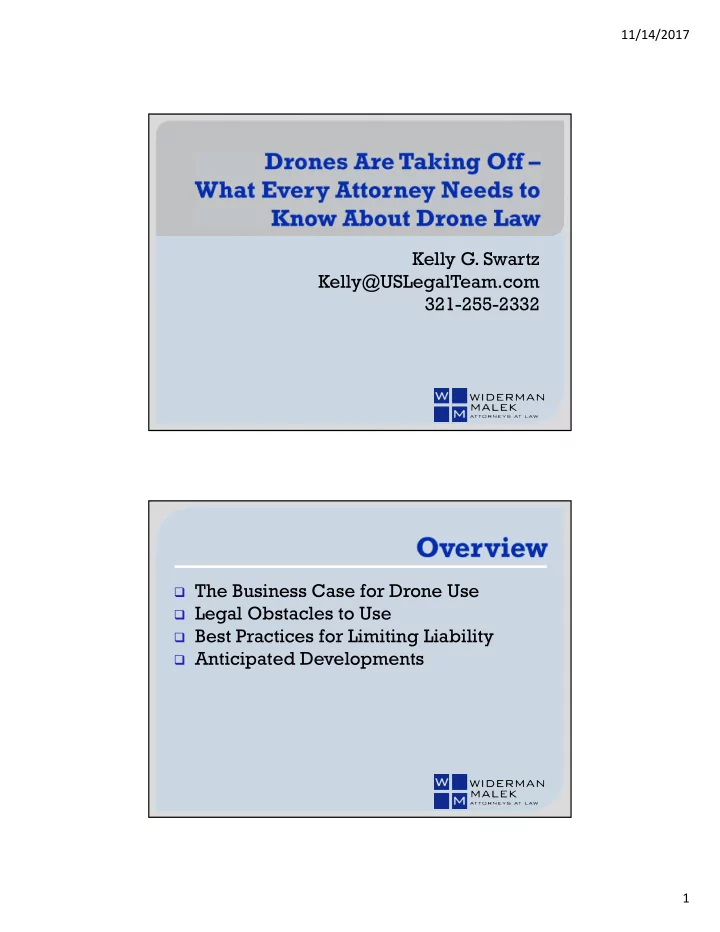

11/14/2017 Kelly G. Swartz Kelly@USLegalTeam.com 321-255-2332 The Business Case for Drone Use Legal Obstacles to Use Best Practices for Limiting Liability Anticipated Developments 1
11/14/2017 Kelly G. Swartz 2
11/14/2017 3
11/14/2017 4
11/14/2017 Faster Cheaper Safer Better Kelly G. Swartz 5
11/14/2017 FAA Regulations Local Regulations Privacy Laws Liability Concerns Technology Issues Organizational Challenges 6
11/14/2017 FAA defines UAS as aircraft Aircraft registration .55 – 55 lbs Over 13 years old Recreation Commercial Section 333 Part 107 7
11/14/2017 Requires pilot to operate drone Must show granting exemption is in public interest Must specify aircraft Must specify regulations from which exemption is requested Typical conditions and limitations: Less than 87 knots (100 mph) Less than 400’ AGL Within visual line of site of PIC One PIC for duration of flight VO in verbal communication with PIC Must petition for amendments Good for two years from grant Pre-flight inspection by PIC Must follow manufacturer’s recommended maintenance schedule 8
11/14/2017 Typical conditions and limitations (cont.): No operations at night (civil twilight flight OK) No operation with 5 nautical miles of an airport unless a letter of agreement with that airport’s management is obtained or a COA is issued UAS must return to predetermined location upon LOS Must have 5 minutes of reserve power in battery Aircraft requires N-number UAS must yield to manned aircraft Must be 500 feet from all non-participating persons, vessels, vehicles, and structures unless there are barriers or permission from the non-participants Permission of property owner must be obtained Exempts the UAS from many FAA regulations, including: Airworthiness certificate Certification Procedures for Products and Articles Display of N-number in letters 6” high Prohibiting compensation for private pilots Keeping a copy of a manual in the aircraft Preflight action Minimum safe altitudes Altimeter settings Fuel requirements Maintenance requirements 9
11/14/2017 Pilot Must be 16 years old or older Must pass knowledge test to obtain RPIC license Must have TSA background check Requirements Aircraft must be less than 55 lbs. Requires RPIC license Within VLOS or VO May pass out of view temporarily No airworthiness certificate RPIC must report to the FAA within 10 days any operation that results in serious injury, loss of consciousness, or property damage (to property other than the UAS) of at least $50 10
11/14/2017 Limitations No night time flight Max altitude 400’ AGL or higher if within 400’ of structure Max speed 87 knots (100 mph) Not over a person who is not directly participating in the operation Not under a covered structure Not inside a covered stationary vehicle Not from a moving vehicle unless over a sparsely populated area May operate in Class G airspace without air traffic control permission Operations in Classes B, C, D, and E need approval from ATC Can request waivers 90 days prior to start of operations Specify regulation or airspace authorization at issue May be approved for up to four years Must describe geographic area Describe proposed operations Justify how operation may be performed safely 11
11/14/2017 Operation from a moving vehicle or aircraft (§ 107.25) Daylight operation (§ 107.29) Visual line of sight aircraft operation (§ 107.31) Visual observer (§ 107.33) Operation of multiple small unmanned aircraft systems (§ 107.35) Yielding the right of way (§ 107.37(a)) Operation over people (§ 107.39) Operation in certain airspace (§ 107.41) Operating limitations for small unmanned aircraft (§ 107.51) Directed to restricting: Location Time Purpose of drone use Directed to requiring: Permits Privacy Insurance Provide Penalties 12
11/14/2017 Florida Statute Freedom from Unwarranted Surveillance Act Louisiana Statute Preempts local regulation Preemption Issue Operational restrictions not allowed Traditional state and local police power are allowed (hunting, warrant, firearm, voyeurism) Aircraft Maintenance Communication Links (fly aways) Short Product Lifecycle 13
11/14/2017 Training programs Creating standards Who manages the program? 14
11/14/2017 Insurance Not covered by general liability policies Damage to drone Damage to people or property FAA fines Invasion of Privacy 15
11/14/2017 Maintenance Safety Audits Preflight Testing Operations Checklist Training Incident Response Procedure Form Waivers/Consents General Allowable reasons for operating UAS FAA compliance State that all UAS flights must be in compliance with FAA regulations. Refer to applicable waivers or exemptions 16
11/14/2017 FAA compliance State that all UAS flights must be in compliance with FAA regulations. Refer to applicable waivers or exemptions Personnel Define roles (PIC, VO, Coordinator) Establish who may fly UAS Establish who may be involved in UAS operations Policy for removing authorization Provide authorized personnel with copy of SOP 17
11/14/2017 Training Establish frequency and content of training for each role. Initial Ongoing Record Retention Policy What? How long? Training Establish frequency and content of training for each role. Initial Ongoing 18
11/14/2017 Incident Response Who does it? What information is obtained? What is sent to FAA? What information is publicly disclosed? Privacy Establish procedures in compliance with corporate privacy policy Intellectual Property Who owns imagery captured by UAS? 19
11/14/2017 Pre-Flight Process Checklists Airspace Ensure part 107 compliance or obtain waiver Weather Documentation log book inspection weather operation 20
11/14/2017 Facilities Where are UAS stored? Who may remove UAS from storage? Audits Who? When? What? Scheduling First come? Prior approval? Maintenance What? When? Who? Records? 21
11/14/2017 Review Procedure Establish procedure for meeting to discuss changes to laws and technology. Update policies accordingly. What activity is allowed? Who is allowed to operate the UAS? Where is UAS operation allowed? How are non-participants notified? How do non-participants consent? 22
11/14/2017 Inform Obtain consent Avoid Process to ensure FAA compliance Due diligence Contractual warranties and indemnity 23
11/14/2017 Kelly G. Swartz Increase crop yields Verify insurance claims Assisting in future entertainment “Last mile services” 2016 $2 billion global market 2020 $127 billion global market 24
11/14/2017 Further definition of UAS safe airspace System for controlling movement through UAS safe airspace Move from education to enforcement Harmonization of federal and local regulations Kelly G. Swartz Kelly@USLegalTeam.com (321) 255-2332 25
Recommend
More recommend